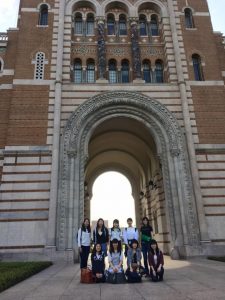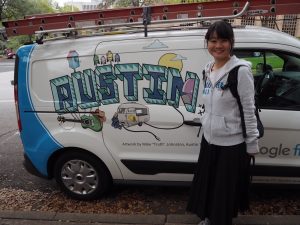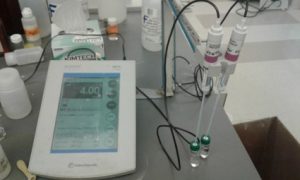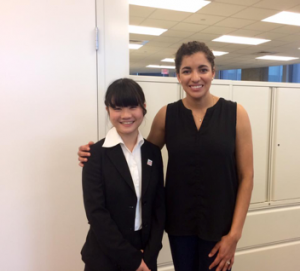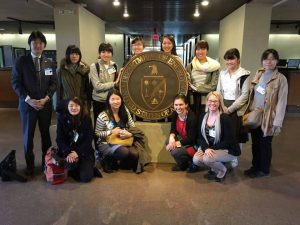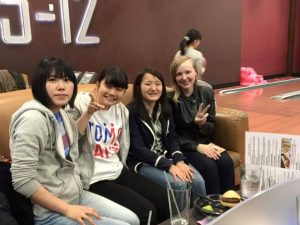[:en]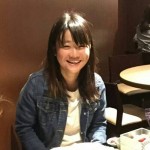 Aya Kawamura
Aya Kawamura
Hometown in Japan: Kariya, Aichi
University in Japan: Nagoya University
Major & School Year: Applied Chemistry, B2
Host Advisor: Prof. Zachary Ball, Dept. of Chemistry
Host Lab: Ball Research Group
Why TOMODACHI STEM @ Rice University?
I would like to study in the US mainly because of its famous scholars, the state of the art research centers, and the stimulating discussions that animate classrooms. Compared to the Japanese academic scene, the way research is conducted in America is at the antipodes. I believe that good science is made through experiments and critical discussion, and this short experience in the US would give me a good insight of whether to pursue my master’s in the US or in Japan. Also at Rice University, participants can get support from the laboratory in another field, too. This is one of the most different point from Japanese universities. Moreover, being that the US one of the most culturally diverse countries in the world, I could meet many students from different nationalities and get in touch with their cultures. I think international cooperation is indispensable for scientists because environmental problems have no country boundaries. Because of its cultural diversity, I also have many things to learn in the US, too.
My dream is to provide solutions for environmental problems by creating new materials using chemical technologies. During this program, I would like to conduct research in Materials Chemistry, test the characteristic of many materials, and experience first-hand how experiments are performed. This experience would enable me to critically think about what kind of research I want to do in the future, and help me gain fundamental skills to lead independent future research projects. TOMODACHI STEM @ Rice University 2017 is a precious chance for me, I’m looking forward to attending this program and aspire to learn and perform a laboratory research, and get to know people from all over the world in Rice University.
Goals
- Make many friends and keep in touch with them after I go back to Japan, especially with those in the same field of research
- Be able to use scientific term in English fluently
- Be eager to study actively, such as participating in discussions
- Find differences between Rice University and my home university
Excerpts from Aya’s Weekly Reports
- Week 01: Arrival in the U.S.
- Week 02: First Week at Research Host Lab
- Week 03: Interview With a Female Researcher
- Week 04: Research in the U.S. vs. Research in Japan
- Final Research Poster Presentation
- Week 05: Science & Technology Policy Study Tour
- Final Report
Week 01: Arrival in the U.S.
When I first arrived in Houston, I felt nervous, because I haven’t been to the US in a long time. However, at the same time, I was really happy to come back to the US again because I used to live in the US when I was a junior high school student.
So far, my experience is similar to what I have expected in several points. First, there are people from many cultural background, some people are speaking English, some are speaking Spanish, and some others were speaking Chinese, and so on. Now, I enjoy talking with my mentor, who is from the Dominican Republican, but I still feel nervous to communicate with the other students in my lab because they are much older than me and they look busy doing their research. I think they have various cultural background and future dreams, so I’m very interested to know more about them and to become friends with them. Not only in the lab, but in my daily life, I want to be more comfortable with myself and my English, and talk with more and more people. Sometimes, when I’m in a group of people and attending a lecture or working as a group, I hesitate to speak in front of many people even though I have something I want to talk about. I always feel I should have spoken up more at the end of the meeting, and I think too much hesitation is unnecessary; especially in the US. So one of my goals is to become quicker to speak out with confidence.
Second, everything in Houston is large. The size of cars, rooms at the hotel, the area of Rice University, size of meals, and so on. Last but not least, people in Houston are kind and friendly. Sometimes people are not, but usually when you meet with someone, he or she smiles at you, and when somebody is coming from the opposite direction and the street is too narrow to cross, he or she will let you go first. Yet, it is different from my expectation, since I haven’t been to the US recently. (Instead I’ve visited South West Asian countries) Houston is really humid. People eat pizzas way more than I thought. I even think there is a large difference in the US. For example, in Cleveland, where I stayed for 3 years, people drove cars not so quickly. Houston seems that I need to be careful to go out at night because people drive very quickly and there are not so much lights outside.
The seminar given by Prof. Kono and the panel discussion by the Japanese Ph.D students were very interesting because I had never had the chance to hear about applying to an American university for graduate school before. Nevertheless, I still want to get job in Japan after I graduate from my university, because I love my country and I want to work for Japan. So I still don’t know whether I want to pursue a Ph.D program in the US. Also, Sarah’s lecture about inter-cultural communication helped me a lot. After I became a university student, I tried to communicate with people from various cultural background, but sometimes it didn’t go well and that discouraged me a little from cross cultural communication. Sarah’s lecture made me consider things I hadn’t thought very much thought about before, including what is under the “iceberg”. This helped me a lot to achieve my goal which I mentioned in the last paragraph.
The Research Poster Development Seminar was also helpful. I have made some posters and given presentations in front of them before, but overall I’m not very good at talking in front of many people and using the visual material effectively. I want to try hard to make a good presentation. This is my second goal for this program, and the experience will help me improve my self-confidence. I also attended the Rice 90 Second Thesis Competition it was interesting. All the participants looked really confident, and I was eager to know how much of the time they would use to explain the background, their motivation, the detailed research, and the conclusion during the 90 seconds.
My first weekend in Houston was full of new experiences. On Saturday, we went to Rodeo Parade in the morning, Houston Ballet in the afternoon, and Galleria shopping mall at night. At the Rodeo Parade, I didn’t expect to see so many horses. Also looking at each group of people in the horse-drawn carriage, I could feel their honors toward Texas as a state. Especially, at the American Hispanic group, American African group, Girl Scout, and the other ethnic or gender related group, I could feel those people’s strength in Texan society with their identity. Houston Ballet was so beautiful and I got to see in very front, right side seat for a cheap price. I could see the sensitive move, and facial expression of the dancers. It was a precious moment. Also the music of the orchestra was amazing. The networking Brunch at Ms. Donna Cole’s house on Sunday was fabulous. All the women speakers were living strongly, and working hard towards their dream. So far, I haven’t felt any disadvantage as a female scientist, but maybe after I start doing my job, the situation may change. At the end of the party, I could talk with some of the ladies in person, and each of them gave me precious advice for my future. I will not forget their words, and if I feel fear or I get weak, I will remember their words.
After spending one week in Houston, I think I got used to of the city of Houston and Rice University, but I will keep to be cautious in case of danger, will not stop being curious towards US society, and will study hard for the research internship.
Research Internship Update
After Prof. Kono told me I would join the Ball Research Group, I sent an initial e-mail to my host professor. I was not used to sending formal e-mails in English, I proof-read it many times. I got a reply from him, and he gave me 3 thesis to read, and he introduced me to my mentor. This was my first time to read a thesis, and I haven’t done any research before, so it took time to read the English thesis. I checked “How to Read Thesis” webpage which Sarah gave me, and I also asked Natsumi-san about reading thesis because I heard she has already conducted research in the US. At that time, I also started contacting with my mentor. My mentor asked me which theme of their research project I was interested in. In fact, my major is Applied Chemistry, but his research group was doing research in Biochemistry field. So I asked him what basic knowledge I need for Biology. I was relieved to hear my mentor was also from the Chemistry field when he was an undergraduate student. I tried to memorize 20 natural amino acids, and I studied the basic system of fluorescence. Moreover, I asked him about the atmosphere of the laboratory and what kind of souvenir they might like from Japan. That made me feel more relaxed when I visited the lab for the first time.
My advice to future Japanese participants in this program would be to not hesitate to ask anything you are worried about regarding the internship to your mentor. At first, I was a little anxious to ask what I wanted to know because it may sound a little silly. However, my mentor was very nice and he answered my questions kindly. But I have just started the internship, so I have to see whether my preparation in Japan was enough or not as I do the research.
I had spent a couple of days doing research so far, and now I feel I need to study more and learn more English technical terms. My mentor is really nice, and she teaches me a lot, but due to lack of my knowledge, I’m having a hard time understanding her. The assignment which I was given was different from what I heard when I was in Japan, but it is still related to chemistry. So I need to work hard this weekend. My mentor told me I don’t have to come to the lab during the weekend, so I want to spend time reading textbooks and useful webpages. Also, I was surprised that there are not so many students in the lab. The mentor told me that American students stay only at the time that they have something to do. After they are finished, they leave the lab. Also most people are doing the research separately, without talking with others. These points were different from my expectation, and now I feel like I like the Japanese lab atmosphere better where students work together for their goal.
Week 02: First Week at Research Host Lab
On my first day at the lab, which was the first day at Rice, I was pretty nervous. Since I’m still a sophomore, everyone in the lab is much older than me. I participated in the weekly lab meeting, and I introduced myself to Prof. Ball, a post doc student, and the other graduate students in the lab. After that, the meeting started. During the meeting, students made presentations about recent thesis they read, and they provided their research update. There were so many technical terms and words I didn’t know, so I was overwhelmed. I worried a little about whether I could deal with my research project. After that, the professor told me about the details of my research project, and actually my mentor was changed because of the theme of my project.
My new mentor is from the Dominican Republic. She came to the US when she was around 12 years old. Since some of my friends had been to Dominican Republic, I was familiar with the country, so we were able to talk about each other’s country. It is always nice to know about people’s hometown and their culture. Also there is a Japanese graduate student in my lab, so when I have a hard time saying what I mean in English, it is very helpful for me to get advice from him. Moreover, I can ask him about American graduate schools too. I need to thank him a lot. One of the graduate students is from China, and it is nice to talk about each other’s country. Our home countries are both in East Asia, so it is easy to understand each other’s culture, and I feel comfortable to talk with her. Moreover, all the other graduate students in my lab are friendly, and help me a lot. Sometimes we enjoy daily conversations, and at times when my mentor is not in the lab, there is always someone who shows me what he or she is doing. One day, I followed a first year graduate student, she is from Alabama, and she taught me for the whole day. Maybe I felt comfortable talking with her because her age is closer to mine. Also she took me to Chipotle and Starbucks near the BRC.
As I mentioned, I have a hard time understanding and talking about my research in English. Sometimes I wish I could have learned all of my undergraduate classes in English, so that I know the English technical terms. I need to be able to convey it in English by the end of next week for the poster preparation. I learned lots of new vocabulary after I joined the research group. I need to learn more next week as well. The hardest thing was telling about what I might have mistaken during the experiment. Also it is hard to speak about something I’m not sure about, so I need to be confident with understanding my project. Moreover, sometimes I get lazy about asking something I couldn’t understand. This is not a good thing. The accent of some of the students in the lab is also hard for me to understand, so I shouldn’t hesitate to ask when I couldn’t understand them. I’m ok with daily conversation, so I want to talk with my labmates!
Besides research, I also visited the Houston Museum of Fine Arts on Thursday night, NASA on Saturday, and Austin on Sunday. NASA was great. I was amazed that Rice University has funded some parts at the beginning of NASA. I felt that people are great to have gone to the moon such a long time ago. My one day trip to Austin was wonderful too. Before I came to Houston, I didn’t know Texas has a little different history from the other states. Because of it, I could feel the Texan people’s pride a lot in Austin.
Not to mention, visiting Consul-General’s house on Wednesday night was unforgettable too. I got a chance about talk about the TOMODACHI STEM program, and what I have thought about it. I’m not good at making a speech, especially in English, and I get nervous when I stand in front of many people. However, it turned out successfully. There are still some things I need to fix, though. It was nice to meet many people in the party, and hear about their experience. I wish I had had more time!!
Research Update
For the first couple of days, I learned how to synthesize peptide. I learned about Fmoc solid-phase synthesis. Using this method, I synthesized a new peptide from a peptide which my mentor had made and 2 amino acids. There are so many kinds of containers, and tools for making peptide. I succeeded in creating the long peptide. Even though I could understand the name of chemical, it was hard for me to understand the name of the instruments. For examples, vials, Rotavapor, Erlenmeyer flask, funnel, and so on. Mostly, it is called differently in Japanese. This was one of the biggest obstacles I had faced. I studied with the Internet, and the textbook which my mentor had given to me. Also I had to be careful with treating the chemicals too, because some of them were toxic or corrosive.
After I finished with making peptide, I started working with a reaction of peptide and cupper. First, I made a solution with pH 9 buffer, GGH peptide, and Cupper. Then I adjusted the pH of the solution with HCl and NaOH from 9 to 2 at about 0.5 intervals, then I measured the each absorbance of the solution with UV visual. At first, I was not used to using the pH meter, UV-vis, and pipetter, I had a hard time adjusting the pH. I couldn’t get the accurate amount of the solution by pipetter at first, so I practiced when I had a free time. For the 2 times, I didn’t have enough amount of solution in the cubet. Changing the condition, I could finally got a decent result for UV-vis. Also it was hard for me to use the software for UV-vis, too.
I’m not sure about the timeline of my research, since I had problems with the pH meter and I’m not used to experiments, so my project is going very slowly. It is supposed to finished by the end of the third week, but I am a little worried whether I can succeed in my poster session. However, I want to learn as much as possible about research in my lab, and become able to communicate about scientific matters in English. I need to be eager to ask my mentor about something I can’t understand.
Week 03: Interview With Female Researchers
This week, I interviewed 1 female graduate student and 1 female postdoctoral researcher from my host lab. The female Post Doc is my mentor.
First, I would like to share what I have learned from the graduate student. She is first year graduate student. After graduating from a university in her hometown, she came to Rice to pursue Ph.D. in Chemistry. At first when she was an undergrad, she wanted to be a Dietitian, but she become interested in chemical processes in the body and she changed her major to biochemistry. She also enjoys critical thinking and thinking about questions that have no answer. I felt she has a lot of passion for chemistry. She chose to come to Rice because she likes the way research is done here. For example, the student to professor ratio is low, it’s in a big city, and Rice has close tie with the Houston Medical Center. In the future, she wants to be a professor and wants to conduct her own original research but she also realizes that she has more options for her career. In terms of her research environment now, she told me that graduate school is diverse in ethnicity and gender. She doesn’t have any experience abroad, but in the future, she wants to do a summer research internship in a European country, for example, Germany as she has learned German. The advice she would give to women students in STEM fields is, “In the US, girls are more encouraged to be a nurse, lawyer, and so on. I also at first wanted to be a dietitian but I was not afraid to change my major to Chemistry. I want girls to be brave and find what they have an interest in.” Not only as a researcher, has she worked as a mentor to encourage other women to be involved in outreach programs for women, too. She has lots of interest in feminism.
Second, I would like to share what I have learned from the postdoctoral researcher who is my mentor. She is from the Dominican Republican, and she came to US when she was in high school. When she was in high school, she liked chemistry. In college, she also loved taking chemistry classes and she also started research when she was 17, and then she decided to major in Chemistry. She told me that once she had started doing research and figured out how to use her hands, research became fun. When she was an undergraduate, she picked up a lot of things in her lab. After she got into her graduate school and attended a couple classes she decided to major in Organic Chemistry. She wants to pursue academia, but it is limited by location. She wants to be a researcher or college researcher to work as a mentor and educate undergraduate students. In terms of the research environment, she told me that I have to look at people who I will be working with. In her graduate school, people were isolated but here, people work together. It depends on which environment you like. In the field of Chemical Biology, there are many women as another interviewee mentioned. Also, she thinks people from all over the US are needed, not just from some limited places. In the Department of Chemistry at Rice, there are only 2 African American students. She is also the first person to pursue academic field in her family. It can be difficult to go to college if your parents didn’t go to college.
For international experience, obviously, she used to live in Dominican Republic, and she had a collaborative research experience in France for 5 months. She hopes to master French. For her advice to female students in STEM fields, she said “Don’t compare yourself to others. People have good days and bad days too. Don’t be afraid to ask things. There is always a way. There is a lot, but you need to find out by yourself.” Sometimes I feel afraid to ask things because I might be asking a silly question, so I need to overcome that fear. At the end of the interview, she told me that nowadays a big generation of professors are retiring, and she is interested in how the ratio of women to male professor will change.
I had the opportunity to interviews 2 female researchers from quite different backgrounds, but both had a great enthusiasm for Chemistry and wanted to pursue a career in academia. Also they both had strong opinions about women in STEM fields, and their advice was very helpful to me. I felt that they are motivated to educate and mentor students, not only focused on their research. Moreover, I felt that the Post-Doctoral researcher is a very strong woman to become the first person to pursue in higher education in her family. I want to be strong like her. Moreover, it was interesting that in American graduate school, students can communicate smoothly and work together with international students even though they have never been to foreign countries. After the interview, I came up with more questions and I’m curious to know the answer, so I would like to ask them when I have time.
Research Project Update
This week, I purified my peptide by using Rotavapor, and HPLC. Then I characterized the peptide by HPLC and MALDI-MS. The amount of peptide was small since I am not used to using the lab instruments and sadly I spilt some of the solution. I wish I had more time to do the synthesis again. After I prepared my peptide, I made peptide solution with NMM buffer, and Cu2+. Then, I adjusted the pH of the solution with 1M HCl and 1M NaOH from 9 to 2. I recorded absorbance of the solution with UV-vis. It was my 5th time to do this process, so now I was used to it. It takes lots of time to be able to use the instrument. Also using software to analyze the graph was difficult too.
On Monday, one of the graduate students in the lab was doing a rehearsal for her thesis defense. (how do you call the test you have to take to qualify for Ph D. program? If you couldn’t pass this, you will only get master’s degree.) and I was also able to listen to her presentation. After the presentation, not only the professor, but all the other people were enthusiastically giving advice to her. One of the most memorable pieces of advice was that “One of the important things is to be able to describe why you are motivated to do the research with the method.”, which was given by the host lab professor. After I become a graduate student, I want to be able to do a presentation about my research like her.
Week 04: Research in the U.S. vs. Research in Japan
This week, the 4 weeks research internship has finally come to the end. At first, 4 weeks seemed a long time, but actually it past very, very quickly.
During my last week in my lab, all of the experiments were over and I worked on preparing my poster. Making a poster took me longer than I had expected. It was hard to make the color and the layout clean. It was hard to edit graphs and diagrams by using software, Adobe Illustrator and ChemDraw. Also the poster has limited space, so I needed to choose which information to put on the poster. Moreover, I was not still sure that I was understood the research fully so I had to ask a lot of questions. I repeated it a couple times of making poster and revising by my mentor, and it took me almost 4 days to complete it. Summarizing the poster was difficult, too. Sometimes I was misunderstood the point of my research. Finally, I practiced talking in front of the poster out loud. It was challenging for me to say sentences with technical terms, and complicated grammar. It was tough, and I felt I needed to study more English and more Chemistry, but it was a valuable experience. I hope I made any progress in my researching and critical thinking ability. I’m still not sure whether I will do the research in Biochemistry field in the future yet. For my undergraduate research in Japan, I may like to engage in different field of Chemistry and I want to think which topic I like better.
My experience presenting my research poster during the final colloquium at Rice University was challenging. I was a bit shy to catch my audience. It was difficult to answer the questions from them. I got one very detailed question from a person in Dow Chemical, and I couldn’t answer it. Eventually my host professor came and he talked with her, but I was disappointed with myself. I felt relieved when my labmates came to me and listened my poster session. Now, I feel I want to be very good at presenting my research in future. I need to understand my research topic more deeply and I need to improve my English too. Also I need to overcome my shyness.
Overall, I had wonderful experience in my host lab. Since there were 6 graduate students and 1 post doc in my lab, they were on good terms with each other even though some of them were from outside the US and have different cultural backgrounds. They were understanding and interested in each other’s culture. I could ask anyone in my lab when I had trouble with my experiments. All the labmates were willing to help the undergraduate students. They told me do not hesitate to ask questions. People in the lab were helping each other, too. One thing I remember significantly is that when one of the graduate student was having a qualifying exam, almost everyone in the lab was waiting for her outside of the classroom until she was told the final correction for her thesis and presentation. In terms of academic research, I think critical thinking is valued in the US from my experience. When I was having a question regarding my research, not just to answer the question, my labmates asked me questions to give hint towards my question.
On the last day at Rice, my host professor held a lab outing, and we enjoyed eating Texas BBQ. Interestingly, the professor’s family, and some labmates’ wife or fiancés came to the outing, too, and we had the dinner in a big group. I got a chance to talk with my host professor. We talked about graduate schools in different countries. Also I could talk with my mentor about her career as a female researcher. As I said in the last week’s interview, she wants to educate undergraduate students in research as well as to become a professor. When I told her that I appreciated to have my very first research experience in the US, and I became interested to be a researcher, she told me that education could influence student’s career to become a researcher, and that was why she loved teaching. I appreciate to having had her as a mentor. In the end of the dinner, I said thank you and I was very happy to be a part of their lab to each labmate. I want to keep in touch with people I met in the lab.
Now, I definitely miss my labmates, the office and the laboratory in BRC, the atmosphere of Rice University, and friends I got from Kakehashi program or people who Natsumi san introduced to me. If I have a chance, I want to visit Rice University again.
Final Research Poster Presentation
Final Research Project Title: Detection of Copper Complex for Peptide Backbone Moification (PDF)
Host Lab: Ball Research Group
Host Advisor: Prof. Zachary Ball, Dept. of Chemistry
Host Lab: Ball Research Group
Introduction: Chemical modification of polypeptide structure is important for drug development, biomaterials design, and biological probe construction. Secondary structure of peptide decides peptide’s folding stability, and function Peptide backbone N-H bond modification is an attractive goal because it may disrupt the secondary structure of peptides allowing us to better study the role of folding in function. The Ball group recently showed that peptide backbone N-H bond modification is possible with copper salts and boronic acids. It is proposed that this reaction proceeds via a Chan-Lam coupling that requires the formation of a copper complex with the peptide. Dr. Ulloa found through peptide library screen a sequence dependence in the copper-catalyzed modification. My goal is to determine the correlation between peptide sequence and copper complex formation ability at different pH.
Approach: I synthesized Ac-AVHAKKY-NH2 peptide which does not undergo modification, which I will abbreviate it AVH. Then, I made a solution containing the peptide and Cu(OAc)2 in NMM buffer. UV-vis of the solution was recorded, and the pH was gradually adjusted from 9 to 2 in approximately 0.5 interval while recording UV-vis at each pH. UV-vis of 2 kinds of solution containing peptide that can be modified, which is Ac-GGHAKKY-NH2 or Ac-DEHAKY-NH2, was then recorded under same condition.
Results: I succeeded in synthesis of AVH peptide. I found that peptide with good modification efficiency displays significant copper complex formation. On the other hand, the complex formation was not observed for peptide with low modification efficiency.
Discussion: The copper complex formation ability of each peptide sequence is important for the modification process. I obtained one evidence to support the proposed method.
Future Research: We should test other parts of the proposed mechanism for modification and apply this modification to bigger systems.
Week 05: Science & Technology Policy Study Tour
This week, we visited Washington, DC and Lehigh University to learn about STEM related governmental organizations, leadership, and make more networks with women in STEM field. Visiting STEM related organizations was very meaningful for me, since I have been thinking of working in STEM related organizations in Japan as one of the options for my career. I learned there are many kinds of them: organizations to give grants to researchers, such as the National Science Foundation (NSF), advising politicians to make decisions regarding scientific problems, such as the National Academy of Sciences (NAS) and the American Association for the Advancement of Science (AAAS), and organizations engaging in policy making regarding scientific problems, such as the Department of Energy. Every organization we visited was interesting, and I wanted to learn more about them.
It was interesting that US has one independent department for energy whereas in Japan we have the Agency for Natural Resources and Energy, but it is not independent, it is under the Ministry of Economy, Trade, and Industry. One thing that surprised me the most was the strong ties between the US and Japan about nuclear energy and nuclear nonproliferation. I learned many things that I didn’t know before about how the Fukushima accident occurred and its nuclear power plant operations. After I go back to Japan, I would like to contact with one of the organizations in Japan and ask for an internship opportunity. It would be interesting to know the difference between American and Japanese organizations working in this area.
Something I was very surprised about women in STEM fields was the intensity of their networks. Wherever I went in the US and met women working in STEM, I heard about their networks and its importance. As a student, I had never realized the importance of networking, but through communicating with women in professional STEM fields, I could learn about many things they had to overcome because they were women. Also, I found it was easier to communicate with women in STEM fields since we all have a common background and I had a lot things to empathize. Nevertheless, no one had exactly the same experience, and everyone is having their own life independently. Also they had strong opinions about their careers and the problems they want to solve through their careers. Moreover, I felt that our program in Washington and at Lehigh University is made thanks to Sarah’s network with her friends and alumni of her past programs, and I found that not just networking but building long term friendships is precious, looking at her interactions with the co-workers and the alumni.
Final Report
Overall, the TOMODACHI stem program changed my perceptions and attitude in many ways. First of all, my attitude toward Japan changed. By going out of my country, I found good and bad points of my country. Whether I like Japan or not, once I go out of my home country, I am an ambassador of Japan, and I have to be responsible to tell people in another country about Japan. I don’t want Japan to be misunderstood, so I need to have more correct knowledge about Japan, and want to tell the genuine figures of Japan. Secondly, the change to my attitude towards US was that the US is such a large country that people have different thoughts mostly depending on which university or hometown they are from, and there is no right or wrong in the different of ways of thinking. Most Rice University students think getting a PhD degree is important to pursue their career in scientific field even though you don’t want to be a researcher in university, but students at Lehigh University thought opposite. Also many of the graduate students in my lab were engaged or married, but one graduate student, who went to a university in New York when she was in college told me that people in southern part of US tend to get married in the early time of their career path but people in the North don’t. Some people like the nature of Japanese culture and venture out to Japan while some others don’t. Sometimes even one native English speaker couldn’t understand what another native English speaker was talking about because of the difference of their slang and accent. It was interesting to know more about the cultural differences in one country.
Thirdly, the experience at Rice made me think that research is interesting. Before coming to Rice, I had no idea how research is conducted, and how I feel about it. During most of my research internship, I was not sitting on the desk and studying but actually using my hands and doing a series of experiments, which I found very enjoyable. At first I didn’t have much experience in using chemical experimental instruments, but once I got used to it, it was fun, and I wanted to do more experiments. Nevertheless, I could only do what I was told to do from my mentor, and for my poster, I wrote the draft by myself but most of it was revised by my labmates since I didn’t have much experience in using software to analyze data and academic English writing. Also I felt 4 weeks was too short for conducting research and preparing for the presentations. Now I’m eager to study more about my major, and to improve my academic English writing and speaking skills to become able to do research more independently in the future. Moreover, meeting with many, many people, I found there are many research fields I still don’t know. I was so lucky to meet with people from different research areas to hear directly about their research and think about what research field I am interested in.
Last but not least, my personality changed, too. I had had couple experiences to visit organizations or companies in a group before, but I couldn’t come up with questions at the end of their seminars. However, by attending many events through the TOMODACHI STEM @ Rice program, I came to be able to think about the topic from different perceptions, and ask questions. Also the atmosphere of the US let me not hesitate to ask questions. The combination of my experience and the US culture changed me so that I could ask questions eagerly to many topics. I think this is an important thing, and I don’t want to forget this feeling after I go back to Japan.
After a 14-hour flight from Washington Dulles Airport, we arrived Narita Airport. At first, I felt weird that everything was written in Japanese, and everyone around me was speaking Japanese. Then I really realized I’m back in Japan. I was excited to meet my family, and friends, and talk about the brilliant experience in US. Also I couldn’t wait to eat Japanese food and take a long bath in the deep bathtub in my house. However, I’m totally going to miss the exciting days and friends in US, and all of the other TOMODACHI stem program participants. Now, I want to make use of my experience in US and have a fruitful learning in my home university for another 2 years and want to think about future career thoroughly.

